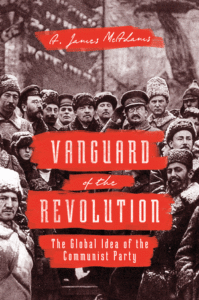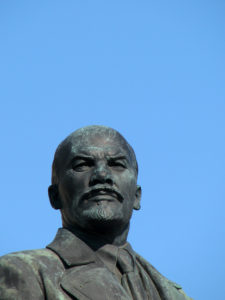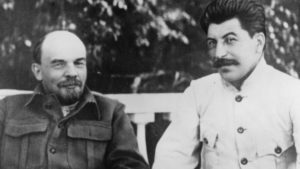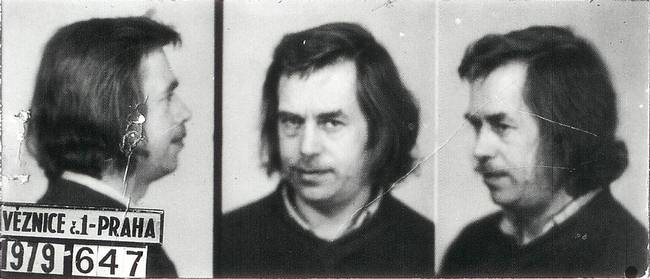PART THREE
The story of the Modern Nation-State is not just about us! For much of the twentieth century there were as many Leninist regimes in the world as Liberal Democratic regimes. In this section of our course, I will focus on the glorious rise and shockingly abrupt demise of the Leninist Nation-State, one of the most dramatic sagas of modern times. These regimes didn’t come from nowhere. As we shall see, they were inspired by an alternate path to the modern nation-state that had its roots in a revolututionary movement known as Marxism.
Here’s a point we can all agree upon: The Leninist regimes of the past century pursued horrific policies; tens of millions of people died under Leninist rule. This is a fact. I have personally experienced life under communist rule, and I have no romantic views about the subject. Still, if we want to make sense of this significant chunk of human history, we have to ask why these regimes lasted as long as they did. In part, the answer lies in the initial promises of Marxism.
Because Leninism represented the preeminent challenge to Liberal Democracy in the modern age, the long life of the communist party also provides us with insight into contemporary political challenges. Its appeal to peoples around the world helps us to understand the continuing popularity and practices of (noncommunist) authoritarian figures, like Vladimir Putin and Kim Jong-un.
In addition, the Leninism‘s long life provides useful clues to understanding the appeal of explicitly anti-liberal movements today. Why do people fall prey to populist and autocratic perspectives in the liberal-democratic world? And why would they be willing to sacrifice the liberties and rights they currently enjoy? In other words, I am suggesting that the past may be present—and future.
I have written extensively on this issue.  If you are interested in my thoughts about communist regimes throughout the world, feel free to read my recent book, Vanguard of the Revolution. It’s in the library.
If you are interested in my thoughts about communist regimes throughout the world, feel free to read my recent book, Vanguard of the Revolution. It’s in the library.
17. LECTURE: Monday, February 27
Reflections on Karl Marx’s Communist Manifesto and its significance for the history of world communism.
Today’s Question: Why did so many smart, well-educated people (i.e., educated elites like you!) become Marxists? My argument is that Marxism shared many of the same foundations as Liberalism, even though it represented a radical critique of Liberal thought. It is essential to understand the Marxist roots of Leninism because they paved the way for the fundamentally different path to the Modern Nation-State.
Let us extrapolate to the present. In the contemporary world, it is equally important to ask why an intelligent person would support violent extremism, either on the Left or on the Right. This human pathology just won’t go away.

Assignment: Read the Manifesto carefully–I suggest, at least three times. It is one of the greatest and most influential publications of all time. Look beyond the details for Marx’s overarching argument. What case is he making against capitalism? Why would it have been so appealing to many 19th and 20th century radicals? Indeed, why might it even appeal to contemporary populist (but non-Leninist) such as Bernie Sanders? As you read the essay, pay close attention to what Marx says about the revolutionary character of the bourgeoisie.
Karl Marx and Friedrich Engels, The Communist Manifesto, Sections, 1, 2, and 4.
Read the following short articles to get a sense for the environment in which Marx’s ideas thrived:
Friedrich Engels, “On the Condition of the Working Class in England” PRINT AND READ
M. Faraday, July 7, 1855, “The Filth of the Thames” TAKE NOTES
To put the movement in a contemporary perspective, read:
John McCain, “Salute to a Communist” READ
How could a middle-of-the-road Republican politician, like John McCain, find anything to admire about a communist? Certainly, McCain was no communist. In my view, McCain was a true American hero. He thought for himself and epitomized the decency and compassion we should expect from any democratic leader. I have visited the Hoa Lo prison in Hanoi where he was held. If you look toward the bottom of this article, you’ll find Cell 13. I have stood next to that door and looked at the guillotine.
18. LECTURE: Wednesday, March 1
Reflections on the roots of the Bolshevik revolution: Czarist Russia and the unintended consequences of imperial ambition.
Today’s Assumption: Marx never expected that his proletarian revolution would take place outside of the most industrialized states in the world, especially Great Britain and Germany. In fact, he redicted it would not occur in places like Russia or, later, places like China and Cuba. So, how did the event happen? Like everything, communism has a history. Now, we shall turn to the Bolshevik revolution of October 1917 in order to understand why this context was better suited to mass upheaval than the western industrial world.

In considering the Bolshevik revolution, I also seek to address the issue of historical and political change. Since people use and overuse the word “revolution” all the time, I want you to think about how we should distinguish between truly “revolutionary” events, on the one hand, and events that are only highly significant, on the other. In my view, with which some observers would disagree, there haven’t been many revolutions in modern history. Indeed, I am not totally convinced that the American Revolution was a “revolution,” at least not socially or economically. Please feel free to disagree with me.
Most likely, some of you have not taken courses on the Bolshevik Revolution. Even if you have, it’s always valuable to learn more. Here is a terrific video that will provide you with some general background about both the Bolshevik Revolution and its antecedents:
“The Russian Revolution,” DocumentaryTube.com (1:33.54) WATCH as much of this film as you can.
19. DISCUSSION SECTION: Friday, March 3
Discussion: The Communist Manifesto was once banned across the United States. Now, you can read it and try to figure out what all the fuss was about. (Or was it simply dumb to ban it?) I am strongly opposed to the banning of books—why do Americans on both sides of the political spectrum fear books, like Fahrenheit 451, Catcher in the Rye, Ulysses, Lady Chatterley’s Lover, The Adventures of Huckleberry Finn, etc? After all, why should we be afraid of words? Yet, the saga continues.
Interestingly, Marx’s thinking was, in some specific ways, consonant with Liberal ideals. This should not be surprising since he was writing at the same time and mostly in the same place as Mill and other liberal thinkers. Yet, he came to radically different conclusions about whether Liberalism’s idealistic principles could be realized. How can both of these claims be true? Keep in mind that Marxism, like woolly mammoths and alligators, and had to come from somewhere. In fact, it had the same historical roots as Liberalism.
Assignment: How might the essential aspects of Marx’s critique of capitalism appeal to contemporary populist politicians, especially Bernie Sanders and, yes, even Donald Trump (but not to non-populist traditional politicians like Joe Biden and Mitt Romney)?
20. LECTURE: Monday, March 6
Vladimir Ilyich Lenin and his successors transformed elementary Marxism into a new political identity: Leninism (originally known as Bolshevism).
Today’s Assumption: Leninism was all about defining the conditions under which Marxist ideals could be realized. Marx did not and could not have imagined how Lenin and his successors adapted his ideas to backward Russia. Although Lenin was a mediocre philosopher and historian, he was a world-historical revolutionary. He knew instinctively how to apply a western recipe for radical change to a backward country. For this reason, I contend that “Marx was archaeopteryx and Lenin was his bird.” See HERE See if you can figure out what I mean by this analogy.
Assignment: The best way to understand the fully tragic implications of Leninism in practice is to see how it was implemented at the height of the Soviet revolution under Josef Stalin. To this end, I am asking you to read the Man himself.
Selections from Josef Stalin, Foundations of Leninism. PRINT AND READ Section 4 (“Dictatorship of the Proletariat”) and Section 8 (“The Party”) Get a general sense for Stalin’s argument; don’t worry about the details. Treat the document as though it is a handbook (like the Boy Scout and Girl Scout handbooks). This is exactly what it was. It was intended to give Bolsheviks a clear and definitive understanding of what they should do and why Marxism was relevant to them.
Revolutionaries typically produce great music, in part because they must motivate their followers. The rousing anthem, “The Internationale,” became the hymn for communist and other radical working-class movements throughout the world.
Watch Pete Seeger sing the The Internationale. I sang it to my tour guides when I was in Pyongyang, North Korea and it drove them crazy. How could they prevent me from paying tribute to one of their ideological forebears! Yet the entire time I was in North Korea, I only saw one picture of Marx and and one of Lenin. Alas–but revealingly–they were removed not long thereafter.
If you would like to listen to then, here are some other versions of the International:
The classic Soviet version WATCH
Also, from the engaging movie ‘Reds’ starring Warren Beatty and Diane Keaton: WATCH
Also, Bill Murray’s puppet sings: WATCH
Also, Rage Against the Machine: WATCH
Also, listen to “Occupy Wall Street” protesters sing the Internationale WATCH (I doubt that many knew the words or understood what they represented, but the fact that they sang it gives us a good idea of the romantic appeal of revolutionary movements. Again, this is relevant to explaining why even repressive movements, such as communism, can last for as long as they do.
21. LECTURE: Wednesday, March 8

Reflections on the transmogrification of Marxist and Leninist utopia into Stalinist terror.
Today’s Assumption: Stalin’s regime of terror was intrinsically, if not inevitably, rooted in the goals and institutions of Leninism. Leninism also degenerated into horrific violence in other countries, especially China. Alas, in this course we don’t have enough time to cover the varied expressions of this degeneration outside of the Soviet Union. However, if you are interested, you can see my account of these experiences in my book, Vanguard of the Revolution. I would also enjoy talking with any of you about these different histories.
The following two background readings are meant to give you an idea of the cult of Josef Stalin and the enormity of the crimes committed under his rule.
“Purges and Hysteria in the Soviet Union”: READ (all six pages)
Ode to Stalin: READ
22. MANDATORY FILM: “Journey to Russia”
Watch this film by Sunday, March 12.
In preparation for my first lecture after break on Monday, March 13, as well as your discussions about Vaclav Havel’s magnificent essay, “The Power of the Powerless,” please watch this one-hour film as soon as you can. “Journey to Russia” documents the experiences of members of an American debate team who traveled to the Soviet Union in the early 1980s and were charged with defending the merits of liberalism and capitalism. It is a fantastic depiction of life as people actually lived it in the Soviet Union at this time, long after the atrocities of Stalinism. When I talk about why communism lasted as long as it did, you will see how this film relates directly to the topic. The film’s depiction of people’s attitudes in the Soviet Union in the early 1980s is exactly what I experienced in living in East Germany and traveling in the Soviet bloc during these years.
You can find the film on our course site HERE
22. DISCUSSION SECTION: Friday, March 10

Paragraph assignment: “If Marx was an archaeopteryx, would that make Lenin his bird?” 
Discussion: You have been assigned to start a political, social, and/or cultural revolution–a real one!–at Notre Dame. Based upon your reading of the the Communist Manifesto and the chapters from Stalin’s Foundations of Leninism, please exuberantly and passionately discuss the following two questions: 1) what would Lenin (and Stalin) advise you to do to foment this revolution? and 2) what challenges would you face in fomenting this revolution and then keeping it going?
SPRING BREAK: MARCH 11 – 19
24. LECTURE: Monday, March 20
Reflections on the Leninist challenge to Liberal Democracy.
Today’s Assumption: Leninism was initially a credible challenge to Liberal Democracy. Its lasting appeal was reinforced by a variety of factors. In the 1980s, I had the rather unusual experience of living in East Germany. I’ll attempt to give you a sense for these factors by sharing some of my experiences in the years before the fall of the Berlin Wall. To live in the Soviet bloc at that time was very different–and, its own way, more “normal”–than under Stalin’s totalitarian regime. I’ll explain how and why.
In the 1980s, all of the experts, including yours truly, were skeptical about the possibility that people living under communism could rise up spontaneously against their leaders. Yet in the late 1970s, dissidents like the physicist Andrei Sakharov and the playwright Vaclav Havel,  were already providing the ideas about why such events might occur.
were already providing the ideas about why such events might occur.
NOTE: Havel’s essay is not only about life in Czechoslovakia. It is about the difference between “living within a lie” and “living within the truth” in any society, including the US. The dispute over the meaning of “truth” and its implications for our behavior is also central to the crisis of American democracy today.
At this stage of our discussion, let’s ask why McAdams and other experts underestimated the power of Havel’s account.
Václav Havel, “Power of the Powerless,” in Open Letters: Selected Writings, 1965-1990, sections I-VI.
The “Power of the Powerless” is challenging reading. Please reserve a significant amount of time for reading this essay. You will need to have finished these chapters for your discussion section on Friday.
To understand the context in which Havel wrote this essay and why it was so difficult to be a dissident under communist rule, read this brief article on the Czechoslovakia’s Charter 77 movement (HERE)
Optional: here is a short article on Havel’s life
25. LECTURE: Wednesday, March 22
Reflections on the sudden and total collapse of the Leninist Nation-State.
Or, Why McAdams was so wrong.
Today’s Assumption: No one predicted this explosive development (in the serious sense of the word “prediction”). By the same token, Leninism was not destined to collapse when it did.
Assignment: Reflect upon Mikhail Gorbachev’s role in the fall of the Leninist Nation-State
Here’s some background to Gorbachev’s concept of Leninist reform READ
Based upon what you have seen, could Leninism have been reformed in the way Gorbachev hoped? How compatible were Gorbachev’s two primary reform concepts (below) with the Leninist political identity?
Gorbachev’s concept of Perestroika SKIM
Gorbachev’s concept of Glasnost SKIM
Implications: What lessons can we learn from the communist experience about the collapse of dictatorships in general? Is it enough to present people with the facts about a dictatorship’s failings to persuade them that the system doesn’t work? This question of human psychology applies to us as well. Why do some intelligent people refuse to accept facts even in liberal democracies?
Additional assignment
In preparation for my upcoming lecture on Colonialism, please watch the wonderful film, “Mister Johnson,” as soon as you can. It’s on our on-line Hesburgh Reserves site HERE
The film, which stars one of the former James Bonds, Pierce Brosnan, is simultaneously engaging, humorous, moving, and tragic.
25. DISCUSSION SECTION: Friday, March 24
Topic: Living within a lie under communism . . . and in advanced democracies?
Discuss the first half of “Power of the Powerless.” Why is the green grocer so important to Havel’s argument? What kinds of events would be required to convince the green grocer that he should rebel? Or does “enlightenment” spring up automatically?
Would you have acted differently than the green grocer if you had grown up in a Leninist state? What types of circumstances would persuade you, too, to rebel?
Paragraph Assignment: To what extent, if at all, do we “live within a lie” in the United States”? Consider this study about the choice between truth-telling and happiness while you write your response: HERE
26. LECTURE: Monday, March 27
Another surprise! As if the fall of Leninism fell between 1989 and 1991 were not a big enough surprise, another surprise came not long thereafter. Almost immediately after these happy developments, most of the the post-communist states of the former Soviet bloc swiftly adopted Liberal Democratic institutions.
Yet despite all the promise of this period, the populations of many of these states now face a sobering question: Will viable democracy survive in any meaningful sense? The past decade’s developments in Hungary, Poland, and Russia give us cause to worry. However, those in Slovakia, Ukraine, and the Czech Republic give us cause for hope.
For your amusement, some peculiar signs of life after communist dictatorship!
Gorbachev sings LISTEN
Vladimir Putin plays piano and sings WATCH
Assignments:
For your discussion section on Friday, finish reading Václav Havel, “Power of the Powerless,” in Open Letters: Selected Writings, 1965-1990.
What is new and what has changed after the revolutions of 1989-1991?
Vladimir Tismaneanu, “The Legacies of 1989: The Moving Ruins” Journal of Democracy, January 2014 See PROJECT MUSE at Hesburgh Library e-Journals PRINT AND READ
Jaroslaw Kuisz and Karolina Wigura, Foreign Policy, May 13, 2020, “Why populists understand eastern Europe better than liberals,” READ
The following articles raise an important question for political scientists: Why and under what circumstances are mythological depictions of leaders more important than addressing the facts about such figures?
Why would Stalin still be popular in Russia? “Stalin Rises Again” READ
Julia Ioffe, “Why many young Russians see a hero in Putin” READ
Once you have read these articles, reflect upon alternative models for this transition: mass extinction or archaeopteryx. What would the adoption of one or the other image tell you about the nature of political change.
27. LECTURE: Wednesday, March 29
I am posting this lecture on both this page and the Post-Colonialism.
A comparison of two ideal types: tradition and modernity.
Today’s Assumption: People in the West frequently denigrate the cultures of the inhabitants of traditional societies. Yet, the norms and institutions of traditional society are as rational as those of modern society. They are simply based upon different cognitions and values. Personally, I find some of the attributes of traditional society to be superior to those of modern societies.
A good example of liberal democracy’s problem with the expression of traditional ways of acting is the French practice of Laicité
Angelique Chrisafis, “France’s Headscarf Rule,” The Guardian,” July 2013 READ
Part of the Western tendency to denigrate other peoples and cultures is due to our hubristic conception of our place in history. Remember Weber’s point about how our “Protestant” predecessors regarded themselves as saved by God. To cite one example of our hubris, we repeatedly hear that so-called Third World countries are invariably corrupt. Yet despite the western assumption that liberal capitalist societies are governed solely by impersonal rules of order, political corruption plays an undeniably present in liberal-democratic societies, too.
For an example, see Glen Thrush, “If I’m corrupt, it’s because I take care of my district” READ (Until his death in 2010, John Murtha, the subject of this article, had been the longest serving representative in the House of Representatives. Most likely, this was the result of taking care of a lot of people! But taking care of whom in particular? Ah…).

REQUIRED FILM: This wonderful film, “Mister Johnson. provides the background for this lecture and the next lecture on post-colonialism. Go to our on-line Hesburgh Reserves site HERE
As you watch the film, think about how the protagonist, Mr. Johnson, is caught between two worlds and then crushed by the contradictions of this relationship. What are the defining differences between these worlds, and in the case of Nigeria, the domestic contradictions of modern and traditional norms?
28. DISCUSSION SECTION: Friday, March 31
Václav Havel, “Power of the Powerless,” in Open Letters: Selected Writings, 1965-1990:
Topic: What must we do to live within the truth? And, how can we convince others to do so as well.
Discussion: Finish your discussion of Havel by asking what makes the green grocer revolt. Is Havel’s analysis persuasive? Or when we are dealing with oppressive dictatorships, is it just wishful thinking to expect that the weak will rise up against the strong?
Similarly, when people living in democracies are persuaded by the powerful to “live within a lie,” is it possible to persuade them to rise up against those seek to manipulate them?
Paragraph Assignment: Identify one example of people “living within a lie” in the United States today and specify how you could persuade them to change their view and “live within the truth.”
